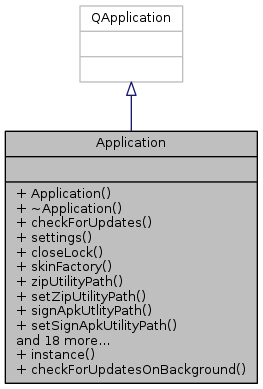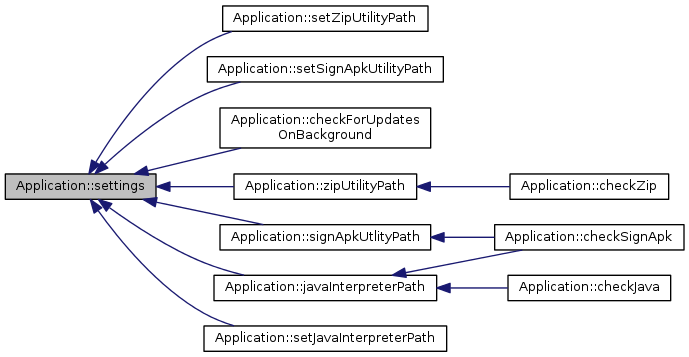 |
BuildmLearn Toolkit
2.0.4
BuildmLearn Toolkit is an easy-to-use program that helps users make mobile apps without any knowledge of application development.
|
 |
BuildmLearn Toolkit
2.0.4
BuildmLearn Toolkit is an easy-to-use program that helps users make mobile apps without any knowledge of application development.
|
Key application class containing all critical elements of the application. More...
#include <application.h>

Public Slots | |
| void | checkForUpdatesOnBackground () |
| Schedules check for updates. More... | |
Signals | |
| void | externalApplicationsRechecked () |
| Emitted if external applications are rechecked which happens usually if path to some of external application changes. | |
Public Member Functions | |
| Application (int &argc, char **argv) | |
| Constructor. More... | |
| UpdateCheck | checkForUpdates () |
| Tries to download list with new updates. More... | |
| Settings * | settings () |
| Access to application-wide settings. More... | |
| QMutex * | closeLock () const |
| Access to application-wide close lock. More... | |
| SkinFactory * | skinFactory () |
| Access to application-wide skin facilities. More... | |
| QString | zipUtilityPath () |
| Access to "zip" utility path. More... | |
| void | setZipUtilityPath (const QString &zip_path) |
| Sets new path to "zip". More... | |
| QString | signApkUtlityPath () |
| Access to path to "signapk" utility. More... | |
| void | setSignApkUtilityPath (const QString &signapk_path) |
| Sets new path to "signapk". More... | |
| QString | javaInterpreterPath () |
| Access to path to "java" interpreter. More... | |
| void | setJavaInterpreterPath (const QString &java_path) |
| Sets new "java" interpreter path. More... | |
| int | checkJava (const QString &new_path=QString()) |
| Tests if binary in new_path is correct JAVA executable. More... | |
| int | checkSignApk (const QString &new_path=QString(), const QString &java_path=QString()) |
| Tests if binary in new_path is correct SIGNAPK executable. More... | |
| int | checkZip (const QString &new_path=QString()) |
| Tests if binary in new_path is correct ZIP executable. More... | |
| void | recheckExternalApplications (bool emit_signals) |
| QString | interpretJava (int return_code) |
| QString | interpretZip (int return_code) |
| QString | interpretSignApk (int return_code) |
| FormMain * | mainForm () |
| Access to main application form. More... | |
| void | setMainForm (FormMain *main_form) |
| Setter for main application form. More... | |
| QList< QAction * > | availableActions () |
| Access to all application-wide useable actions. More... | |
| SystemTrayIcon * | trayIcon () |
| Access to application tray icon. More... | |
| TemplateFactory * | templateManager () |
| Access to template high level manager. More... | |
| bool | externalApplicationsReady () const |
| QString | externalApplicationsStatus () const |
| bool | externalApplicationChecked () const |
| bool | isClosing () const |
| Application closing indication. More... | |
Static Public Member Functions | |
| static Application * | instance () |
| Main static getter of global Application instance. More... | |
Key application class containing all critical elements of the application.
Definition at line 63 of file application.h.
|
explicit |
Constructor.
| argc | Count of arguments passed to the executable file. |
| argv | Array of strings of arguments. |
Definition at line 51 of file application.cpp.
| QList< QAction * > Application::availableActions | ( | ) |
Access to all application-wide useable actions.
Definition at line 233 of file application.cpp.

| UpdateCheck Application::checkForUpdates | ( | ) |
Tries to download list with new updates.
Definition at line 70 of file application.cpp.


|
slot |
Schedules check for updates.
Check for updates is executed in separate thread. Result is announced via tray icon balloon tip. If tray icon is not available, then result is not announced and is suppressed.
Definition at line 316 of file application.cpp.

| int Application::checkJava | ( | const QString & | new_path = QString() | ) |
Tests if binary in new_path is correct JAVA executable.
| new_path | Path to JAVA executable. |
Definition at line 90 of file application.cpp.

| int Application::checkSignApk | ( | const QString & | new_path = QString(), |
| const QString & | java_path = QString() |
||
| ) |
Tests if binary in new_path is correct SIGNAPK executable.
| new_path | Path to SIGNAPK executable. |
| java_path | Path to JAVA executable. |
Definition at line 107 of file application.cpp.

| int Application::checkZip | ( | const QString & | new_path = QString() | ) |
Tests if binary in new_path is correct ZIP executable.
| new_path | Path to ZIP executable. |
Definition at line 126 of file application.cpp.

|
inline |
Access to application-wide close lock.
Definition at line 92 of file application.h.
|
inlinestatic |
Main static getter of global Application instance.
Definition at line 186 of file application.h.
| bool Application::isClosing | ( | ) | const |
Application closing indication.
Definition at line 300 of file application.cpp.
|
inline |
Access to path to "java" interpreter.
Definition at line 126 of file application.h.


|
inline |
Access to main application form.
Definition at line 160 of file application.h.
|
inline |
Sets new "java" interpreter path.
| java_path | New path to "java". |
Definition at line 132 of file application.h.

|
inline |
Setter for main application form.
| main_form | Pointer to main application form. |
Definition at line 166 of file application.h.
| void Application::setSignApkUtilityPath | ( | const QString & | signapk_path | ) |
Sets new path to "signapk".
| signapk_path | New path to "signapk". |
Definition at line 86 of file application.cpp.

|
inline |
Access to application-wide settings.
Definition at line 80 of file application.h.


| void Application::setZipUtilityPath | ( | const QString & | zip_path | ) |
Sets new path to "zip".
| zip_path | Path to "zip". |
Definition at line 82 of file application.cpp.

|
inline |
Access to path to "signapk" utility.
Definition at line 114 of file application.h.


| SkinFactory * Application::skinFactory | ( | ) |
Access to application-wide skin facilities.
Definition at line 74 of file application.cpp.
| TemplateFactory * Application::templateManager | ( | ) |
Access to template high level manager.
Definition at line 255 of file application.cpp.
| SystemTrayIcon * Application::trayIcon | ( | ) |
Access to application tray icon.
Definition at line 246 of file application.cpp.
|
inline |
Access to "zip" utility path.
Definition at line 102 of file application.h.

